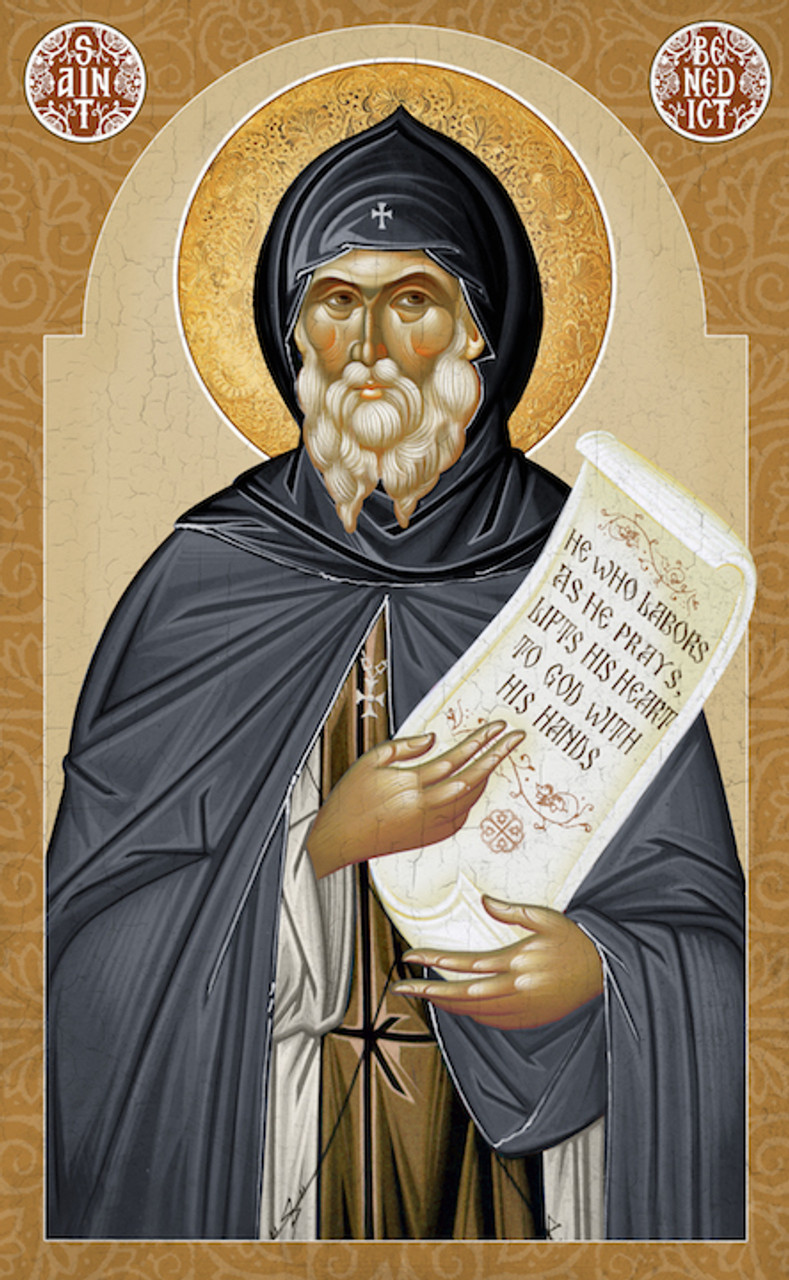
Life. (480-547?)
This great monk, whose religious rule is still followed by monks and nuns throughout the world, was born into a noble Roman family in Nursia (now Norcia, near Spoleto, Italy). The only adequate account of his life (but a dependable one) is to be found In Book II of the Dialogues, a work written by Pope St. Gregory the Great some fifty years after Benedict of Nursia’s death.
Benedict’s parents sent him to Rome for his higher education. There the teenager came into contact with Mideast leaders of the monastic movement. But Rome itself was at that time in the throes of political and moral disorder. Benedict, fearing to become tainted by its corruption, eventually took flight to the mountains some 30 miles east from Rome. Having sorted out his options during a period of quiet and prayer, he decided to become a hermit. A local monk named Romanus offered to help him and showed him to a mountainside cave outside Subiaco. There Benedict spent the next three years in secret, battling to subdue his body and his will. Finally, however, the people of the locality discovered the unkempt recluse. They began to take their problems to him, and found his instruction inspiring. After a while, the monks from a monastery at neighboring Vicovaro, having lost their superior by death, invited Benedict to become their abbot.
Benedict, knowing that these monks had a reputation for unruliness, consented only reluctantly. The monks of Vicovaro soon showed their true colors. Finding their new abbot too strict for their taste, they decided to poison him! But God revealed the plot to the intended victim; and when they brought Benedict the jug of poisoned wine, he made the sign of the cross over it and it broke into pieces. “God forgive you, brothers,” he said to them without rancor. “Why have you plotted this wicked thing against me? Go and find an abbot to your taste.” With that he left them. Once back at Subiaco, St. Benedict responded to the appeal of the many who now sought to become his disciples by establishing in the rugged valley twelve small wooden monasteries, each accommodating twelve monks. Although each little house had its own prior, Benedict was the grand master and the spiritual father. He had not as yet written a formal monastic rule. For the time being the monks simply followed his instructions and example.
All went well for several years. Then, however, Florentius, an unworthy priest from the vicinity, who had developed an intense hatred for the abbot, started a relentless persecution of him and his monks. Around 528, therefore, Benedict and the monks suddenly abandoned Subiaco and journeyed some 48 miles southeast by the inland route to Casinum (Cassino). On the nearby hill called Monte Cassino, Abbot Benedict laid the foundations of the famous abbey that still towers above Cassino and remains the official “mother house” of Benedictine monks. It was here, during the following decade, that the founder finally set down his rule in writing. Other monastic founders had written rules before, but Benedict’s excelled them all in balance. Most western monastic orders established since then (and many “active” orders as well) have followed or borrowed from this wise document.
By the time of his death, St. Benedict had also won a wide repute as a missionary, almsgiver, miracle-worker and prophet. Having foretold six days in advance the date of his passing, he died standing on his feet in the abbey chapel, hands raised to heaven. His sister (and seemingly, his twin), St. Scholastica, had been superior of convents under his jurisdiction both at Subiaco and at Cassino. She had died just 40 days before, and been buried within the abbey on the mountain. Now her brother was laid to rest beside her.
Allied forces bombed the historic monastery on February 14, 1944, but it was restored by international funds in the 1950s and the shrine of the two saints was rehabilitated.
On October 24, 1964, Pope Paul VI formally declared St. Benedict patron saint of Europe. Because of the saint’s wide and enduring religious and cultural influence, the designation was fully deserved. --Father Robert F. McNamara
Gracious God, whose service is perfect freedom and in whose commandments there is nothing harsh nor burdensome: Grant that we, with your servant Benedict, may listen with attentive minds, pray with fervent hearts, and serve you with willing hands, so that we might live at peace with one another and in obedience to your Word, Jesus Christ our Lord, who with you and the Holy Spirit lives and reigns, one God, now and for ever. Amen. (ECUSA)